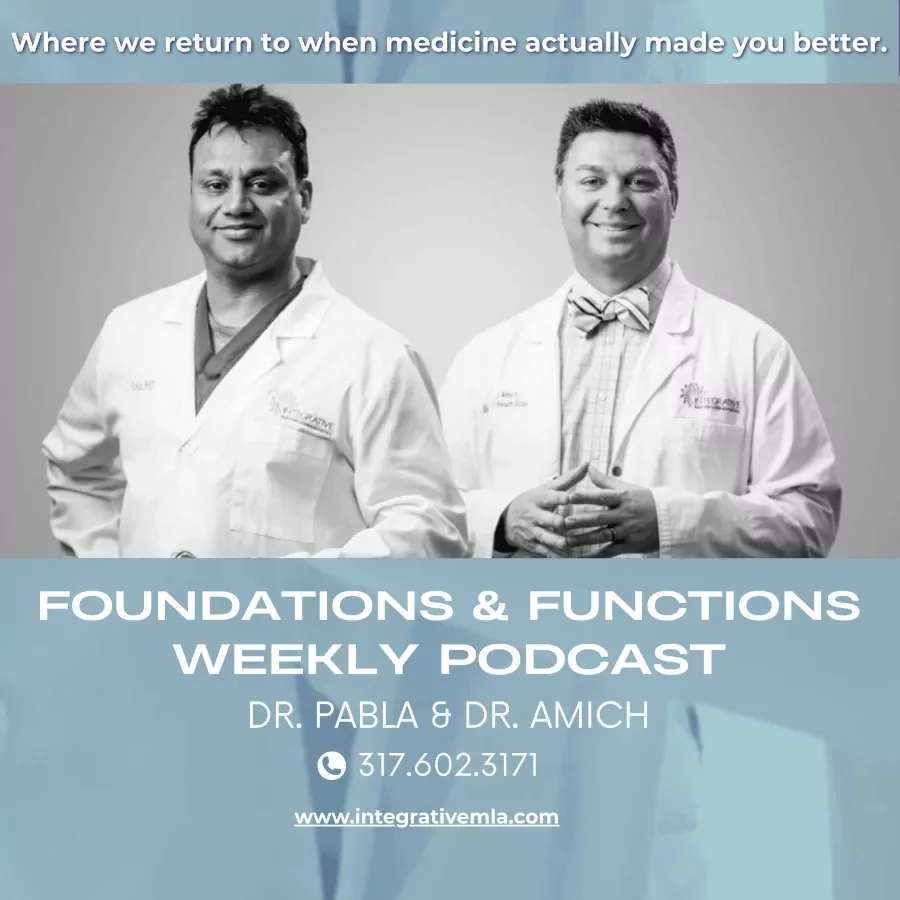Show Description
Foundations and Functions is a weekly podcast hosted by Dr. C.J. Pabla and Dr. Jason Amich that challenges the current medical model by returning to the core of what medicine was meant to do—make people better. Drawing from their extensive experience in emergency medicine, critical care, and integrative health, Dr. Pabla and Dr. Amich dig into the foundational principles of human physiology and the root causes of chronic illness. Whether it's unraveling the mystery behind hypertension, uncovering hidden mold toxicity, or connecting seemingly unrelated symptoms to gut health, each episode offers insightful, real-world discussions grounded in science and practical clinical experience.
Designed for patients who feel unheard or stuck in a system of short visits and fragmented care, the podcast is a deep dive into personalized medicine that values time, thoroughness, and education. Dr. Pabla and Dr. Amich believe true healing happens when we make sense of the body's signals, ask the right questions, and have the freedom to connect the dots. Through compelling cases and thoughtful analysis, Foundations and Functions offers hope, understanding, and a roadmap for anyone looking to reclaim their health by addressing what truly matters at the root.
Disclaimer:
The information provided in this podcast is for educational and informational purposes only and is not intended as medical advice. The content is not a substitute for professional medical care, diagnosis, or treatment. Always seek the advice of a qualified healthcare provider with any questions you may have regarding a medical condition.
If you would like more detailed medical information, please contact Integrative Medicine through their website at https://integrativemla.com/
Show transcription:
- 3 0:00
Welcome to Foundations and Functions weekly podcast, where we return to when medicine actually made you better. Now, here's Dr. Jason Amick and Dr. C.J.
- 8 0:14
Pabla.
- 2 0:16
Welcome to Foundations and Functions with Dr. C.J. Pabla and Dr. Jason Amick. Dr. Pabla, why the name, foundations and functions?
- 1 0:25
Well, kind of like the foundation of a house, right? It starts from the ground up. The foundation is not strong, the house is not strong. So just like in science, foundational things like the structure of a protein, you change the structure, its function changes, right? So that's kind of what we wanted to get through in the podcast is, these are very important concepts, and we want to kind of weave this concept through all of our podcasts.
- 2 0:57
Darrell Bock And it speaks a little bit to how we think and talk every day in terms of, you know, patient conditions, patient issues, is, you know, we understand that the foundation of homeostasis and the normal physiology people are supposed to have. And so getting back to, you know, fundamental foundational clinical science, clinical medicine, and understanding how what we do every day affects the function of our body.
- 2 1:25
So when you have symptoms, it's letting you know that there's something off with maybe the function. And so we can tie that into the foundations. What are the root causes? What are the basic principles of physiology that we can apply to help people get better?
- 2 1:43
And so, one of the goals that we have, and we always say is do we want to
- 1 1:50
return to when medicine made you feel better.
- 2 1:53
So talk, tell me about that. Talk about that. What does that mean to you when you when you
- 1 1:57
say we want to return to when medicine made you better? You know, when somebody presents to our office, instead of just kind of looking at, you know, the basic symptoms and consider maybe, you know, medicine for short term, which initially may help stabilize symptoms, we want to kind of work upstream, right? We want to get to that root cause. For example, if you come in for hypertension, maybe you need an antihypertensive medicine to stabilize that.
- 1 2:25
But what are the reversible causes of hypertension? Sleep apnea, hypercortisol, multiple other things that we can look at. So obviously addressing weight, lifestyle, caffeine toxicity, right? So foundational stuff is really working upstream and really trying to address those root causes. And I think this is one thing that, you know, I think we do well in our practice. We spend enough time. And I think that's the key is really spending that time
- 1 2:57
with a patient unraveling the mystery.
- 2 2:59
Yeah. And I think we both have a lot of experience in medicine, in emergency medicine, critical care, hospital administration. And I think some of this, for me, helps remind us that the American health system that we currently have really doesn't do a great job of actually healing people. It used to be, used to be focused on that quite a bit and I think now when we look at all the statistics and data, despite the fact that we spend a tremendous amount
- 2 3:33
of money on healthcare compared to any other first world country, we have some of the worst outcomes, infant mortality, maternal mortality, diabetes, obesity, heart disease, all these things. And no doubt, we do a phenomenal job with acute care, trauma, strokes, heart attacks, best in the world hands down. But actually making people better or what do you always say about type 2 diabetes? The best way to treat type 2 diabetes is?
- 1 4:04
Dr. Darrell Bock's don't get it.
- 2 4:05
Don't get type 2 diabetes. So we can get to that level of returning to when medicine focused on, not necessarily just even preventative care, but avoidance care. How do we keep you from getting a disease anyway? So with that in mind, let's talk a little bit about who our target audience is.
- 2 4:29
When we do this podcast, because we talk a lot amongst ourselves, and we do a tremendous amount of education with our patients, what's something that you could point to to say, look, this is who we want to reach?
- 1 4:41
This is our target audience. Well, I mean, I think that's a broad range. I mean, men and women, you know, children. I think, you know, our target audience is people that might have had chronic issues that aren't being addressed necessarily. Not just, you know, talking about preventative care, but, you know, maybe they've gone to multiple providers and they have this mysterious illness, and, you know, the 15-minute to 20-minute medical model isn't working because they have multiple symptoms and no one's connecting the dots, you know.
- 1 5:17
They might see a different specialist for each one of these symptoms or each one of these disease processes, and no one, unfortunately, is connecting the dots. And that's kind of like what we see. So you know, obviously, we do do acute care medicine, we do some urgent care in the office, and we love doing that.
- 1 5:34
But really addressing those people that have gone to multiple different providers, and you know, haven't really, no one's really addressed their root cause. I guess that's kind of the general audience we really appeal to quite a bit.
- 2 5:49
Yeah, and I think two things that come to mind. One of those patients that come in, like I've had, for example, high blood pressure for the last 15 years. I'm about to start my fourth blood pressure medicine, but no one can help me figure out why I have this
- 2 6:04
or what I need this for. And then I think the other side of it that sets us apart is that audience, you know, that patient, that medical consumer. You know, like you said, you know, 9 to 11, 9 to 15 minutes, that's the average time that you spend face-to-face with a provider in the United States.
- 2 6:20
And you know, one of the things you always say is you can't solve complex problems, you know, in 10, 15 minutes. Dr. John Alder Reid Right. Dr. John Alder Reid You need more time to really dig into that. And so I think, you know, this will be a whole other podcast someday, but from a, you know, even an insurance model, you know, I think the fact that is looking at that, you know, they're paying out of pocket and going, what am I getting for this? What did I just pay for in that office visit?
- 2 6:50
So I think that's a big chunk of drive for patients who come see us because they want their questions heard, they want answers, and they want to feel like that there was a value in this visit that they just had with us.
- 1 7:06
So, right. Well, I think the other big thing is we limit the complexity by seeing, you know, much less patients and knowing them in depth, you know, getting all their data, reviewing their data well before seeing the patient and not, you know, having to see 30 to 40 patients a day, which is driven by unfortunately insurance issues. And so we have the freedom to really spend that time.
- 1 7:31
And I think that's where the, a lot of our patients get resolution of their symptoms because we finally connect the dots. And you know, that can take an hour. That can take two hours, you know what I mean?
- 7 7:45
Dr. Darrell Bock Yeah.
- 1 7:45
Dr. Robert Pulsner But I don't think, no matter how intelligent of a physician you are, I don't think 15 minutes is going to solve that problem.
- 2 7:52
Dr. Darrell Bock Yeah. And I think one of the things that sets us apart is this concept that we carry around with making it make sense. Even today, we had a patient that we were just spitballing about, like this is their lab value, doesn't seem to make sense with their symptoms, so where else should we be looking? What else can we be doing to help them? And just kind of throwing out a neurological basis,
- 2 8:18
an endocrine basis, what are all the possible reasons that this person could be having the symptoms, but at the end of the day, how do we help the patient understand the symptoms they're having, why they're having them, and what the next best steps are for them? So yeah, we definitely spend a lot of time with patients. Education is very key for us because again, we just love treating every patient like a
- 2 8:39
research case.
- 6 8:40
Yeah.
- 1 8:41
Yeah. You know, and then also having access to, you know, other biotech companies that can really help us dig into the mystery. Like sometimes the mystery is you have multiple symptoms and no one bothered asking the patient, oh, by the way, do you have water damage in your home? Oh, by the way, do you have mold in your home?
- 1 9:00
You know, mold toxicity is one of those mysterious illnesses that can cause multiple symptoms. And so really then helping not only educate the patient, but then demonstrating to the patient, yes, you have mycotoxins because we've done the appropriate test. So I think that's the other thing that we figured out over the years in our practices, who's our go-to to help us figure out some of these mysteries. And I think that takes time to find the companies that are going to give you valid information
- 1 9:30
so you can share that with the patients. And that's important, not only to help the patient, but then they can actually see, oh yes, my mycotoxins are very elevated. And yes, this correlates, maybe not not causation but correlates and is
- 2 9:46
resulting in some of your symptoms. And digging through those symptoms you know you know near and dear to my heart is gut health and and gut dysbiosis and so one of things I share with patients is sometimes you have these 12, 15, 17 random symptoms that don't I call them just white noise and you know if we can tie that back to your gut health we can get your gut healthy, sometimes we can reduce those symptoms or even eliminate those symptoms completely.
- 2 10:11
Now what's left are the two or three symptoms that are really at the heart of your discomfort and issue.
- 5 10:18
So...
- 1 10:19
Yeah. I use the term dust settles a lot with the patients. I said, you know, you're coming in pretty ill, multiple symptoms. Let's walk you, you know, to 30 to 40 percent better. See what symptoms peel away because, A, you know, we address your gut issues first, and then, you know, when these symptoms go away, then we can follow the other symptoms, you
- 1 10:40
know. So we're really big on looking at that. Patients can be overwhelmed. Well, how am I going to get better when I have 20 different symptoms? Well, that's for us to try to focus on those core symptoms first and address that core issue first. And then, you know, they come back a couple months and they feel really great and they say, but I still have insomnia and I still might have some fatigue, but hey, these are gone now. Okay, well, now we have another subset of core symptoms that we're going to look at
- 1 11:06
to address those issues.
- 4 11:07
Dr. Darrell Bock Yeah.
- 2 11:08
So I think it's a great introduction, and hopefully we've given you a little bit of insight of how we think we can get better medicine through foundations and functions. So ultimately, again, we just want to return to when medicine made you better. Thanks for spending time with us today. Thanks for listening to our podcast. There are going to be a lot more coming. And so please stay tuned. And we'll talk to you soon.
- 3 11:36
The information provided in this podcast is for educational and information purposes only and is not intended as medical advice. The content is not a substitute for professional medical care, diagnosis, or treatment. Always seek the advice of a qualified health care provider with any questions you may have regarding a medical condition. If you would like more detailed information,
- 3 11:58
please contact Dr. Amick or Dr. Pabla at Integrative Medicine through their website at Integrative Medicine through their website at integrativemla.com.


